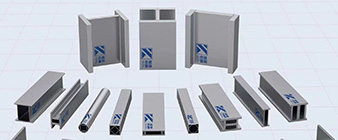High temperature resistance:
310S stainless steel is designed to withstand high temperature environments, with maximum service temperatures up to 1150°C (2102°F).
The alloy’s high chromium content (24-26%) and nickel additions (19-22%) provide excellent resistance to oxidation and scaling at high temperatures.
This makes 310S stainless steel the first choice for applications involving high temperature conditions, such as furnace components, heat exchangers and industrial process equipment.
Corrosion resistance:
310S stainless steel exhibits excellent resistance to a variety of corrosive environments, including oxidizing acids, sulfur-containing compounds, and high-temperature chlorides.
The alloy’s high chromium and nickel content and the addition of small amounts of molybdenum give it excellent corrosion resistance.
This corrosion resistance makes 310S stainless steel suitable for a variety of industrial applications, such as the chemical processing, petrochemical and power generation industries.
Mechanical Properties:
310S stainless steel has good mechanical strength, with typical tensile strength of 515 to 725 MPa and yield strength of 205 to 515 MPa.
The alloy also has good ductility and toughness, maintaining good ductility and toughness even at high temperatures.
These mechanical properties make 310S stainless steel suitable for applications requiring structural integrity and load-bearing capacity, such as high-temperature equipment and industrial components.
Solderability and Fabrication:
310S stainless steel can be easily welded using a variety of techniques, including TIG, MIG, and Stick Arc Welding (SMAW).
The material’s good ductility and formability make it easy to manufacture, including bending, rolling and machining, to produce a variety of shapes and parts.
This manufacturing flexibility enables the design and construction of complex high-temperature structures and equipment using 310S stainless steel.
Thermal Expansion and Thermal Conductivity:
Compared with other stainless steel grades, 310S stainless steel has a relatively high coefficient of thermal expansion, which should be considered in the design of high temperature applications.
The alloy also has moderate thermal conductivity, which may be a factor in the design of heat transfer systems or components.
310S stainless steel is a high-performance austenitic alloy with excellent resistance to high-temperature oxidation and corrosion, as well as good mechanical properties and manufacturing characteristics. These properties make 310S stainless steel the first choice for a variety of industrial applications, especially in environments exposed to high temperatures and corrosive conditions.
If you have specific projects or further inquiries, please feel free to ask Peak Kong Special Steel Co., Limited.!
-
 2024-9-25 Introduction to 254SMO and UNS S31254 Super Stainless Steel
2024-9-25 Introduction to 254SMO and UNS S31254 Super Stainless Steel -
 2024-9-25 2507 super duplex stainless steel in nuclear power of Innovative application
2024-9-25 2507 super duplex stainless steel in nuclear power of Innovative application -
2024-9-27 926 / 1.4529 stainless steel structural hollow sections
-
 2024-9-16 2304 VS 1.4362 stainless steel performance
2024-9-16 2304 VS 1.4362 stainless steel performance -
 2024-9-25 Application of 1.4404 stainless steel structural profiles in civil engineering
2024-9-25 Application of 1.4404 stainless steel structural profiles in civil engineering -
 2024-9-21 S690 steel Welding
2024-9-21 S690 steel Welding -
 2024-9-25 What are the typical applications of Stainless Steel 430/1.4016 structural profiles?
2024-9-25 What are the typical applications of Stainless Steel 430/1.4016 structural profiles?



